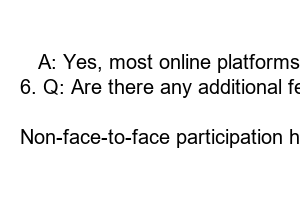주민등록 사실조사 비대면 참여
Title: Embracing Non-Face-to-Face Participation in Resident Registration Fact-Finding
Introduction:
In this digital age, non-face-to-face participation has become the new norm, transforming the way we interact and carry out various tasks. One area that has seen significant change is resident registration fact-finding, where traditional face-to-face methods are being replaced with more convenient and efficient alternatives.
Subheadings:
1. The Shift towards Non-Face-to-Face Participation
With advancements in technology and the widespread availability of internet services, non-face-to-face participation has gained immense popularity. It enables individuals to engage in activities remotely, saving time and effort.
2. Benefits of Non-Face-to-Face Registration Fact-Finding
By embracing non-face-to-face participation in resident registration fact-finding, individuals can enjoy numerous advantages. These include increased convenience, reduced paperwork, and quicker processing times.
3. Utilizing Online Platforms
Digital platforms have become instrumental in facilitating non-face-to-face participation. Government agencies and organizations now offer online portals where residents can input their information securely, eliminating the need for physical visits to registration offices.
4. Emphasizing Data Security
As with any online interaction, concerns about data security arise. However, government agencies and organizations have taken significant measures to ensure the protection of personal information during non-face-to-face registration fact-finding. Encryption protocols and advanced security measures are put in place to safeguard sensitive data.
5. Overcoming Challenges and Disparities
While non-face-to-face registration fact-finding offers immense convenience, it is crucial to address challenges and disparities. Efforts must be made to bridge the digital divide and ensure that all residents, regardless of age or technological literacy, can participate efficiently.
6. The Future of Resident Registration Fact-Finding
Non-face-to-face participation is here to stay, revolutionizing the way we carry out everyday tasks. It is expected that the trend will continue to evolve, with the integration of advanced technologies like artificial intelligence and biometrics, further streamlining the process.
Frequently Asked Questions (FAQs):
1. Q: Is non-face-to-face participation secure?
A: Yes, stringent security measures are implemented to safeguard personal information during the process.
2. Q: What documents are required for online registration?
A: The required documents may vary depending on the jurisdiction, but typically include proof of identity and residency.
3. Q: Are there any age restrictions for non-face-to-face participation?
A: No, individuals of all ages can participate, as long as they have access to the required technology.
4. Q: How can I ensure my data is protected?
A: Follow recommended security practices such as using strong passwords and avoiding sharing personal information on unsecured networks.
5. Q: Can I make changes to my registration details online?
A: Yes, most online platforms allow residents to update their information as needed.
6. Q: Are there any additional fees associated with non-face-to-face participation?
A: The process is typically free, but there may be charges for document printing and delivery in certain cases.
Summary:
Non-face-to-face participation has revolutionized resident registration fact-finding, offering convenience, efficiency, and enhanced data security. By embracing digital platforms and overcoming challenges, individuals can register and update their information efficiently from the comfort of their homes. As technology advances, non-face-to-face participation is set to shape the future of various administrative processes, offering even more streamlined services.

